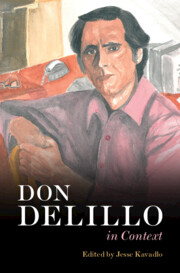Book contents
- Don DeLillo In Context
- Don DeLillo In Context
- Copyright page
- Contents
- Contributors
- Acknowledgments
- Abbreviations
- Introduction: Context, Content, Conflict
- Part I Places
- Part II History and Politics
- Chapter 5 The Cold War
- Chapter 6 The Kennedy Assassination
- Chapter 7 Terrorism
- Chapter 8 The Twenty-First Century
- Chapter 9 Prescience
- Part III Media and Pop Culture
- Part IV Literary Contexts
- Part V Material Contexts
- Part VI Social and Cultural Constructions
- Part VII Writing and Writers
- Further Reading
- Index
- References
Chapter 6 - The Kennedy Assassination
Paranoid Suspicions
from Part II - History and Politics
Published online by Cambridge University Press: 19 May 2022
- Don DeLillo In Context
- Don DeLillo In Context
- Copyright page
- Contents
- Contributors
- Acknowledgments
- Abbreviations
- Introduction: Context, Content, Conflict
- Part I Places
- Part II History and Politics
- Chapter 5 The Cold War
- Chapter 6 The Kennedy Assassination
- Chapter 7 Terrorism
- Chapter 8 The Twenty-First Century
- Chapter 9 Prescience
- Part III Media and Pop Culture
- Part IV Literary Contexts
- Part V Material Contexts
- Part VI Social and Cultural Constructions
- Part VII Writing and Writers
- Further Reading
- Index
- References
Summary
The Kennedy assassination traumatized a nation, and the official investigation conducted by the Warren Commission (1963–64) contained discrepancies that invited conspiratorial speculation. Subsequent investigations by the Church Committee (1975–76) and the House Select Committee on Assassinations (1976–79) raised questions regarding the covert activities of the CIA, particularly the enlistment of the Mafia to assassinate Castro, which reframed the entire Kennedy assassination. Skepticism regarding the findings of the Warren Commission and revelations from the Church Committee fueled a cultural paranoia that pervades the work of Don DeLillo, particularly in a run of novels from Players (1977) and Running Dog (1978) through The Names (1982) and Libra (1988). Deeply indebted to the findings of these three flawed investigations, DeLillo’s fictionalization of the life of Lee Harvey Oswald, Libra, mines this paranoia, but also contextualizes the JFK assassination within an American social totality marked by contradictions and antagonisms. By exploring historical trauma in a way that calls into question official history, Libra represents an exemplary work of what Linda Hutcheon calls historiographic metafiction.
Keywords
- Type
- Chapter
- Information
- Don DeLillo In Context , pp. 58 - 67Publisher: Cambridge University PressPrint publication year: 2022

